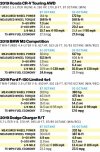A 12% increase huh? You sir, have what is known as a unicorn vehicle.

Car and Driver did a good article titled "Is Premium Gas Worth It?" It compared a bunch of different vehicles in both dyno testing and actual real world results.
It began explaining something about octane:
"
Raising the octane rating (also known as the anti-knock index) doesn't change the energy content of a gallon of gasoline. A higher octane rating indicates greater resistance to knock, the early combustion of the fuel-air mixture that causes cylinder pressure to spike. When higher-octane fuel is flowing through its injectors, the engine controller can take advantage of the elevated knock threshold and dial in more aggressive timing and higher boost pressures to improve performance."
It ran through many cars and trucks with similar results. It did not have a Ram 5.7 but did have a Charger 5.7. The article stated:
"
Saddled with elephantine heft and eager to spin its rear all-season tires at launch, the Charger posted the same 4.9-second hustle to 60 mph on 87 and 93 octane. At triple-digit speeds, the higher power on 93 octane gave the Charger an advantage measured in tenths of a second. The Dodge also posted a 0.3-mpg improvement on premium with its average of 23.5 mpg. Just as important, the bellicose roar of the iron-block Hemi and the Charger's ability to reduce its rear tires to jungle-gym ground cover are unaffected by the fuel in the tank.
While Ford's EcoBoost F-150 stands out as an obvious exception, the Dodge Charger's numbers make for a tidy summary of our findings. If you buy fuel with an octane rating above the manufacturer's requirement, you're likely to feel it in your wallet more than the seat of your pants."
The posted results for the test vehicles. Notably the Hemi was almost unfazed by the difference in gas grades. No faster 0-60, a couple tenths in a quarter mile and 2 tenths of a mile per gallon.
View attachment 111286
Don't sell that unicorn. They are very rare. Jay Leno might be giving you a call.













